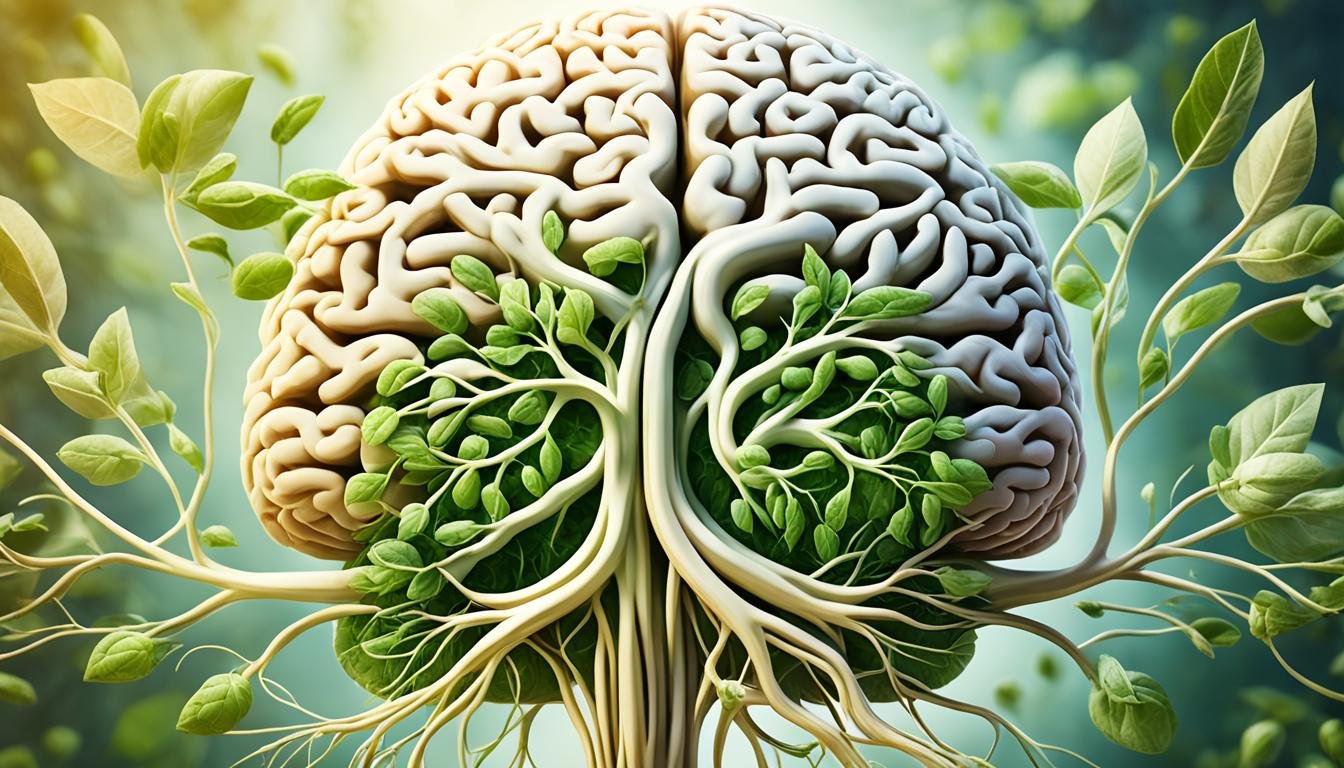Discover Ashwagandha Benefits for Your Health

Ashwagandha, an ancient Ayurvedic herb, has been used for centuries. It’s known for its many health benefits. These benefits can help you live a healthier life.
It can reduce stress and boost your immune system. It also helps with brain health and sleep. Adding ashwagandha to your daily routine can change your life for the better.
Key Takeaways
- Ashwagandha is an ancient Ayurvedic herb with a long history of use in traditional medicine.
- It offers a wide range of scientifically-proven health benefits, including stress relief, immune support, and anxiety reduction.
- Ashwagandha can also enhance brain function, reduce inflammation, and improve muscle strength and endurance.
- Incorporating this adaptogenic herb into your daily routine can help promote overall well-being and improve your quality of life.
- Discover how ashwagandha can be a natural solution for your health and wellness needs.
What is Ashwagandha?
Ashwagandha, also known as Withania somnifera, is an ancient Ayurvedic herb. It has been used in traditional Indian medicine for centuries. This plant is classified as an “adaptogenic” herb. It helps the body adapt to stress and maintain balance.
An Ancient Ayurvedic Herb
The roots and leaves of the ashwagandha plant have been used for their health benefits. Ashwagandha is a rasayana. This means it’s a type of herb that helps with physical and mental health, increases longevity, and fights disease.
Botanical Classification and Description
Ashwagandha is classified as Withania somnifera, part of the Solanaceae family. It’s a small, woody shrub that grows up to 150 cm tall. The plant has oval leaves, yellow flowers, and red berries that look like small tomatoes.
Ashwagandha grows in the dry regions of India, Pakistan, and Sri Lanka. It loves arid and semi-arid climates. You can find it growing wild in these areas.
“Ashwagandha has been used in Ayurvedic medicine for over 3,000 years as a ‘rasayana’ for its wide-ranging health benefits.”
Ashwagandha Benefits
Ashwagandha is an ancient herb from Ayurveda that’s gaining popularity for its health benefits. It’s known for its ability to help with stress, improve brain function, and more.
This herb is great for managing stress and anxiety. It helps balance the body’s stress response by controlling cortisol levels. Studies show that taking ashwagandha can lower cortisol levels, leading to better stress management and well-being.
Ashwagandha also supports a healthy immune system. It has antioxidants and anti-inflammatory compounds that boost immune function and protect cells. Research points out that it may increase white blood cells and natural killer cells, helping fight infections and keep the immune system strong.
It can also help with anxiety and depression. By balancing neurotransmitters like serotonin and GABA, it calms the mind. This reduces feelings of worry and low mood.
Ashwagandha is good for brain health too. It may improve memory and protect against cognitive decline. Its neuroprotective effects come from reducing inflammation and oxidative stress in the brain.
It’s also studied for its anti-inflammatory properties, helping people with arthritis. Its compounds can reduce joint pain and swelling.
Additionally, ashwagandha supports muscle strength and endurance. It helps produce muscle-building hormones and reduces muscle damage. This can help with fitness goals and improve physical performance.
Lastly, it can improve sleep quality. By managing cortisol levels and balancing neurotransmitters, it helps with sleep cycles. This means easier falling asleep and more restful sleep.
The evidence for ashwagandha’s health benefits is strong. It helps with stress, supports the immune system, boosts brain function, and strengthens muscles. This ancient herb is a powerful ally for overall well-being.
“Ashwagandha is truly a remarkable herb with a wide range of therapeutic applications. Its ability to modulate the body’s stress response, enhance immune function, and promote overall health makes it a valuable addition to any wellness regimen.”
Stress Relief with Ashwagandha
Ashwagandha is an ancient Ayurvedic herb known for its stress-fighting abilities. It’s an adaptogenic herb that helps the body handle stress better. It lowers cortisol levels, which is a sign of stress.
Adaptogenic Properties
Ashwagandha is special for its stress-relieving effects. It’s an adaptogen, which means it helps the body deal with stress better. It works with the HPA axis to manage stress, making you feel calm and strong.
Lowering Cortisol Levels
Ashwagandha lowers cortisol levels, the “stress hormone.” High cortisol can harm your health. Studies show that taking ashwagandha can lower cortisol, helping you feel balanced again.
“Ashwagandha has been shown to be effective in reducing cortisol levels, a key biomarker of stress, in both human and animal studies.”
Ashwagandha fights stress by lowering cortisol and acting as an adaptogen. Adding it to your life can help you handle daily stress better. It’s a natural way to improve your well-being and resilience.

Boosting Immune Function
Ashwagandha is an ancient Ayurvedic herb known for boosting the immune system. It helps the body fight off infections and diseases. This makes it a great choice for those wanting to stay healthy.
Ashwagandha is an adaptogen, which means it helps the body handle stress. Stress can weaken the immune system. By reducing stress, ashwagandha keeps the immune system strong.
Studies show ashwagandha increases the activity of immune cells. These cells are key in fighting infections and viruses. With ashwagandha, the immune system gets a boost, helping to prevent illness.
Ashwagandha also has anti-inflammatory effects. Inflammation can weaken the immune system. By reducing inflammation, ashwagandha supports a healthy immune response.
Adding ashwagandha to your daily routine can help your immune system. It’s a natural way to fight stress and stay healthy. If you want to boost your immune function, ashwagandha could be a good choice.
“Ashwagandha has been used for centuries in Ayurvedic medicine to support immune health and resilience. Its potent adaptogenic properties make it a valuable ally in maintaining a robust and balanced immune system.”
The evidence shows ashwagandha is great for boosting the immune system. Adding this herb to your routine can help keep you healthy. It’s a smart way to support your immune function and overall health.
Reducing Anxiety and Depression
The ancient Ayurvedic herb ashwagandha may help those with anxiety and depression. Studies show it can lessen symptoms of these conditions. It does this by balancing the brain’s neurotransmitters.
Balancing Neurotransmitters
Neurotransmitters like serotonin and GABA are key for mood and emotional health. Too little of these can lead to anxiety and depression. Ashwagandha helps balance these neurotransmitters, making them healthy again.
Research shows ashwagandha boosts serotonin, the “feel-good” chemical. This can ease depression and make people feel better.
Ashwagandha also helps GABA, a neurotransmitter that calms the mind. With more GABA, people may feel less anxious and more relaxed.
“Ashwagandha’s ability to balance neurotransmitters is a key factor in its efficacy for addressing anxiety and depression.”
Ashwagandha tackles the neurochemical imbalances that cause mental health issues. It offers a natural way to fight anxiety and depression.
Enhancing Brain Health and Cognitive Function
Ashwagandha is an ancient Ayurvedic herb known for its benefits to brain health. Studies show it can improve brain function naturally. This makes it a great option for those wanting to boost their mental abilities.
Ashwagandha helps protect and support the brain. It has antioxidants and anti-inflammatory properties that fight oxidative stress and slow down brain aging. This is especially good news for people with Alzheimer’s disease, where brain cells degenerate over time.
Ashwagandha also boosts cognitive function. It can make memory, attention, and decision-making better. This makes it a great choice for anyone looking to improve their mental skills. Its adaptogenic properties help the brain handle stress and stay sharp.
“Ashwagandha has the remarkable ability to support and protect the brain, while also enhancing cognitive abilities. As an ancient Ayurvedic remedy, it offers a natural and holistic approach to optimizing mental health.”
Ashwagandha also helps balance neurotransmitters like serotonin and dopamine. This can improve mood and mental health. It can ease symptoms of anxiety and depression, which can hurt how well we think.

In summary, ashwagandha is a strong ally for better brain health and thinking skills. Its many benefits make it a natural way to support mental health and improve mental performance.
Anti-Inflammatory Properties of Ashwagandha
Ashwagandha is an ancient Ayurvedic herb known for its anti-inflammatory effects. It contains compounds like withanolides that help control inflammation. These compounds could help reduce chronic inflammation, like in arthritis.
Potential Benefits for Arthritis
Arthritis causes a lot of pain and inflammation in the joints. Studies show that ashwagandha might help people with arthritis. Ashwagandha’s anti-inflammatory properties could lessen joint pain, swelling, and stiffness.
A study in the Journal of Ayurveda and Integrative Medicine looked at ashwagandha for osteoarthritis. The ashwagandha treatment improved joint function, reduced pain, and made life better for those taking it.
“Ashwagandha has shown remarkable potential in managing the symptoms of arthritis, thanks to its ability to modulate inflammatory pathways and provide relief to individuals struggling with this debilitating condition.”
More research is needed to understand how ashwagandha fights inflammation and its long-term effects. Ashwagandha is natural and safe, making it a promising option for arthritis treatment.
Using ashwagandha could help people with arthritis feel better and live better. Always talk to a healthcare professional before adding ashwagandha or any supplement to your health plan.
Building Muscle Strength and Endurance
Ashwagandha, an ancient Ayurvedic herb, is known for boosting physical performance. It helps increase muscle strength and endurance. Studies show it can improve muscular power, exercise capacity, and recovery from muscle damage.
A study in the Journal of the International Society of Sports Nutrition found ashwagandha supplements helped. People taking ashwagandha did more reps in resistance training. This shows they had better muscle endurance.
Another study in the AYU Journal looked at athletes using ashwagandha. It found ashwagandha increased VO2 max and helped with recovery after hard workouts. This means ashwagandha could be great for athletes and those who work out a lot.
Ashwagandha’s adaptogenic properties help improve physical performance. It helps the body handle stress and stay balanced. This lets people push harder and get stronger and more enduring muscles.
“Ashwagandha has been shown to significantly increase muscle strength and endurance in multiple studies, making it a valuable supplement for athletes and fitness enthusiasts.”
In conclusion, the science backs up using ashwagandha for muscle strength and ashwagandha for endurance. This ancient herb could be a natural way to boost physical performance and support health.
Improving Sleep Quality
Ashwagandha, an ancient Ayurvedic herb, greatly improves sleep quality and sleep cycles. Studies show it helps regulate the body’s natural sleep-wake rhythms. It also makes sleep deeper and more restful, and cuts down on sleep problems.
Regulating Sleep Cycles
Ashwagandha helps control the body’s circadian rhythms, which is the 24-hour cycle that affects sleep and wake times. It balances cortisol levels, a key hormone for sleep. This balance helps reset sleep patterns, making sleep better and longer.
It also boosts melatonin, the hormone that controls sleep and wake times. More melatonin means easier falling asleep, longer sleep, and waking up feeling refreshed.




